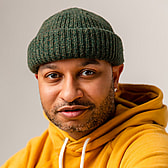Editor’s note: The following article is an op-ed, and the views expressed are the author’s own. Read more opinions on theGrio.
I recently watched the Netflix release Hustle, which stars Adam Sandler as Stanley Sugerman, a scout for the Philadelphia 76ers who finds a player in Spain that he believes is a sure thing and the journey to get him drafted. In this film, Stanley is married to Teresa, who is played by none other than Dana Owens, more popularly known as Queen Latifah. As odd of a pairing as Sandler and Latifah seem on paper, they actually worked really well together on screen. It was just another role that Queen Latifah has been in where she did a good job and helped successfully tell a story worth watching. And it reminded me of something I’ve thought about for quite some time: Queen Latifah really deserves all of the flowers for what she’s given to Black culture, music and entertainment.
So we’re going to do that.
But first, we must dance. Just kidding.
Seriously though, I actually vividly remember the first time I ever saw Queen Latifah. I was living in Bad Homburg, Germany in 1989—my father was stationed in Frankfurt—and one of the ways we military brats stayed connected with the cultural happenings in the United States of America was via VHS tapes of shows like Rap City and Martin and Beverly Hills, 90210. As kids, we’d pass around the videotapes and share cassette tapes made by family members stateside. Since most things got to us in Germany months late, we’d all show up for the first day of school up-to-date with life back home, but by the middle of the school year, save for the VHS and cassette tapes, we were mostly behind.
I used to devour the VHS tapes with Rap City episodes. I remember seeing the video for Queen Latifah’s single “Ladies First” with Monie Love for the first time. I was transfixed. Queen Latifah had so much presence, she seemed like the most important person alive in the extremely (to me, at the time) Afrocentric video. She presented like an elder stateswoman. Little did I know that she was only 19 when I saw that video. You could have told me she was 35 (ancient to a 10-year-old) and I’d have believed you.
And then over the next few years (I moved back to America in June 1993), I would see her videos and knew she was a force to be reckoned with musically. When she dropped “U.N.I.T.Y.” in late 1993, I remember feeling like she created an anthem. Queen Latifah would regularly come up in our convos about rap stars during hip-hop arguments while playing basketball.
And then the movie Set It Off happened in 1996 and Queen Latifah’s character Cleo became an icon. She took that acting ball and ran with it, racking up a tremendous number of roles and nominations and awards, even receiving an Oscar nomination for her role in the musical Chicago! My personal favorite movie that starred her (in any role) include Brown Sugar (one of my favorite movies of all time) and her starring film The Last Holiday, a movie that I literally rewatch every single time I see that it’s on. My wife wonders why I love it so much and I have no idea. I just do.
Of course, we can’t talk about the screen without her small-screen successes. Living Single is a cultural force, still heralded today for its charm and humor. But get this, she was the leading character Khadijah James in the early to mid-’90s. She’s STILL a leading role character as Robyn McCall on the television adaptation of The Equalizer in 2022. Some 30 years later, she’s still a leading role kind of talent!
She’s had her own daytime talk show in The Queen Latifah Show, hosted the Grammys and written two books. Look, this is a mini and incomplete list of her accolades and that’s important because it just illustrates how much of a presence she’s been as a hip-hop icon for over 30 years. Queen Latifah has been an artist who has advanced the way we think of individuals through her music and the roles she’s taken. She literally created women’s anthems in “Ladies First,” which still jams and is still relevant even today, 32 years after its release.
Queen Latifah is a hip-hop artist who literally showed us all just how far you can take this rap game. She can sing, act, rap, host, write and make a difference just by existing. I appreciate all that Queen Latifah has done by showing me what you can do if you stay true to yourself and give yourself a chance to do what feels right.
Hopefully, Queen Latifah, like many of the other folks whose hip-hop careers have expanded the definitions of hip-hop and deaded the idea of limitations on hip-hop will continue to create and be a presence for decades to come. We’re all better for it. I firmly believe this.
She put ladies first, told us she’s had it up to here and then demanded some unity. And now she’s an icon.
All hail the Queen.

Panama Jackson is a columnist at theGrio. He writes very Black things and drinks very brown liquors, and is pretty fly for a light guy. His biggest accomplishment to date coincides with his Blackest accomplishment to date in that he received a phone call from Oprah Winfrey after she read one of his pieces (biggest) but he didn’t answer the phone because the caller ID said “Unknown” (Blackest).
Make sure you check out the Dear Culture podcast every Thursday on theGrio’s Black Podcast Network, where I’ll be hosting some of the Blackest conversations known to humankind. You might not leave the convo with an afro, but you’ll definitely be looking for your Afro Sheen! Listen to Dear Culture on TheGrio’s app; download here.


